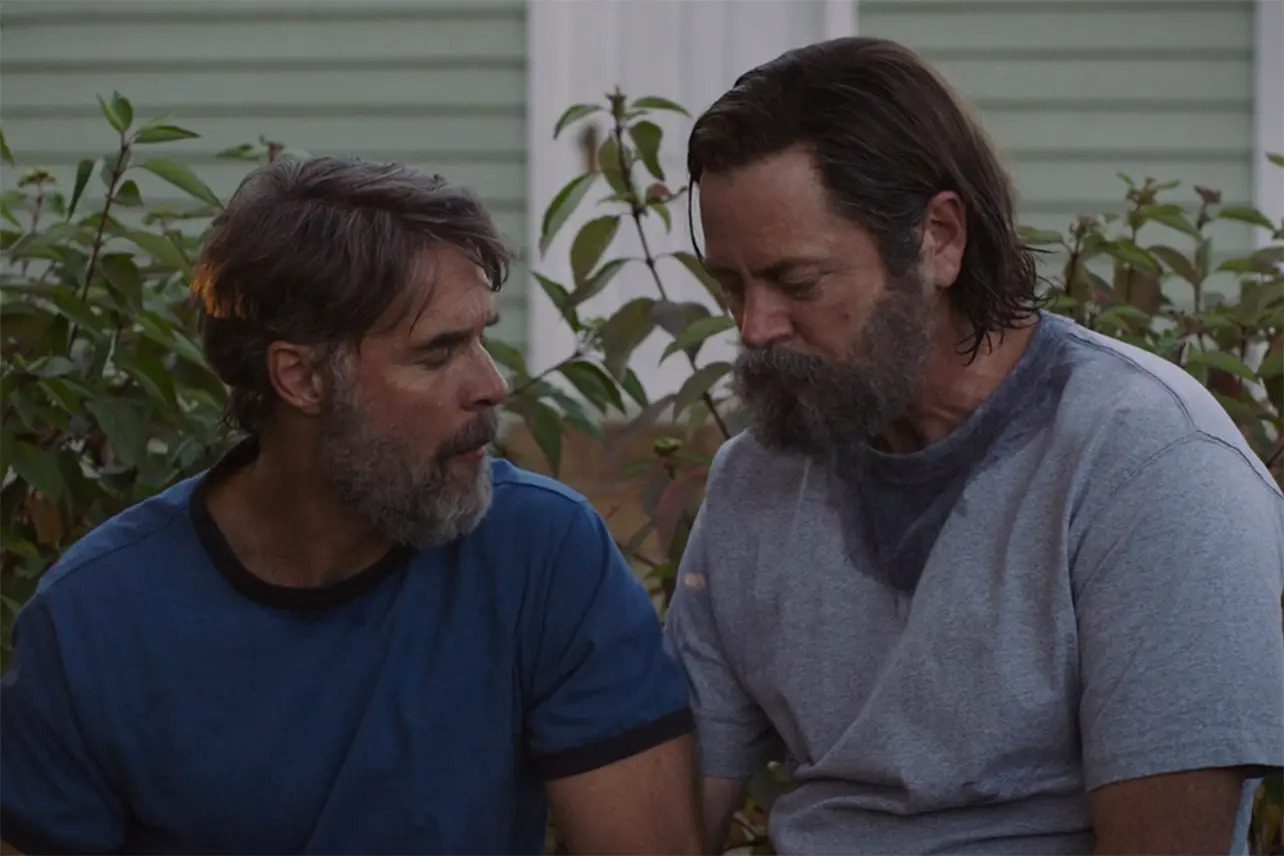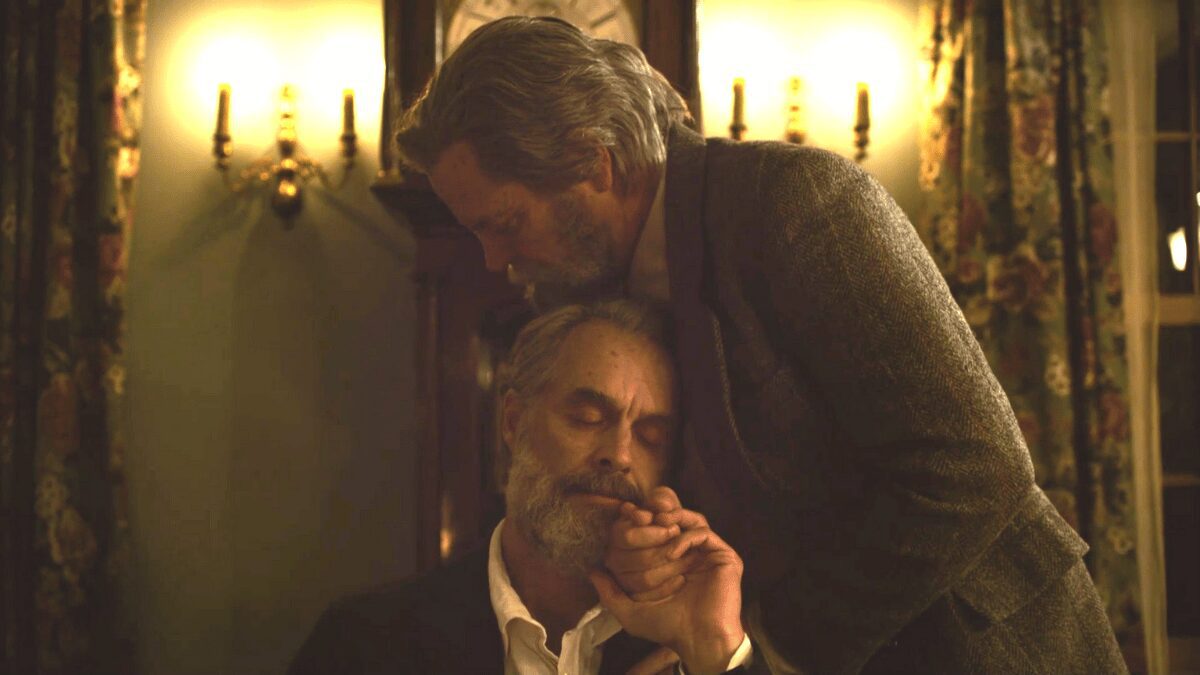REVIEW: The Last of Us – Season 1, Episode 3, “Long Long Time”
Rarely in the history of television has an episode of TV earned its title to the degree that this week’s episode of The Last of Us, “Long Long Time,” did. This 80-minute trudge-fest of an episode contained nothing but bloat and not a single ounce of the source material. The farce is over, as this show has completely divorced itself from the video game. The story of this season is not progressed in the slightest, the main characters — or any characters featured outside of “Long Long Time” — are not developed at all, and nothing of importance whatsoever happens. Those enjoying The Last of Us can skip “Long Long Time” without missing anything, and in doing so, their enjoyment of this show may survive this utterly pointless episode.
**Spoilers**
“Long Long Time” follows the love story of Bill and Frank from the time of the initial zombie outbreak until their awkward mutual suicide, soon before Joel and Ellie reach their settlement. Joel and Ellie, the main characters of the show, are in “Long Long Time” for a grand total of five minutes, split between the beginning and the end. For the rest of this episode’s long, long runtime, barely anything of note occurs, and what does is contrived nonsense fueled by stupidity and gay stereotypes. It is difficult to review this episode, as so little of consequence happens that even an in-depth breakdown would be brief.
For the Joel and Ellie portions of “Long Long Time” — otherwise known as the important parts — Joel continues to be depicted as a two-dimensional piece of cardboard with zero personality, while Ellie is increasingly shown to be not only idiotic but psychotic. In a world where zombies share a hive mind and are attracted to sound, a character who constantly makes as much noise as possible, wanders off, and tortures trapped zombies for some perverse pleasure would be nothing but a detriment to basic survivability, yet that is Ellie in this episode. Beyond that, she’s also shown to be entirely insensitive and incapable of comprehending human emotions. Within hours of Joel losing the one person he seemed to care about and could regularly rely on, Ellie berates him for being depressed and withdrawn, making it about herself.
The best way to describe the feel of this episode is an uncomfortable sensation of misplacement. “Long Long Time” seems more suited for a Hallmark, CW, or reality TV show, but not in a post-apocalyptic zombie thriller, action, and horror series, as The Last of Us claims to be. Cheesy lines such as “You were my purpose,” “That’s how we show love,” and “I’m not a whore,” would be more at home in any of those other types of shows. As it stands, they come across as discomforting, bizarre, and devoid of quality.

The two characters at the forefront of “Long Long Time,” Bill and Frank, are not characters in their own rights. They are merely the personifications of cheap and lazy gay stereotypes driven to the extreme and utilized as an excuse for the writers not to put any effort into their development or dialogue. There is a 5-10-minute-long conversation about decorating the neighborhood. There is a musical theater section. There are minutes dedicated to how good a cook Bill is and how impressive it is that he knows how to pair wine with his food so well. This is not Bill. This is not Frank. This is not The Last of Us. By giving Bill this strange post-apocalyptic gay utopia rather than the story of the video games, the audience was robbed of Bill and Ellie’s chemistry — or lack thereof — the true tragedy of Frank’s demise, and several action set pieces.
When it comes to the action, there is merely a single 30-second set piece that comes out of nowhere as a vain attempt to conjure stakes. The problem is both Bill and Frank act like idiots throughout this brief action sequence. Bill, a talented prepper and gunman, decides the most defendable position in his fortified town is in the middle of the street with nothing but a bolt action rifle, well in view of the attackers hidden in the darkness outside the fence. The episode tells us that Bill is intelligent, yet it shows him being completely inept at the basic tenets of tactics and human instinct. After Bill gets shot for his stupidity, he admits that his defenses will take care of the rest of the attackers. This means he knew there was absolutely no reason whatsoever to go outside his house or fire at the hunters, giving away his position. He consciously chose to make the worst decision possible. What compounds the ineptitude of this sequence is that the manufactured stakes this scene is meant to incur are immediately diluted by another time jump far into the future, so far that Bill’s injury is entirely healed. The stakes are nonexistent as a result.

This entire episode is totally pointless for a myriad of reasons provided within the episode, but even more so considering Tess’s final instructions to Joel before her death last week. For some bizarre reason, Tess believed that Bill and Frank would take Ellie off Joel’s hands and finish the mission for him. What about this prepper loner who hates strangers led Tess to believe that he would travel across the country, abandon his carefully created compound, and deliver some unknown girl to the fireflies? If Tess had merely said that Bill could give Joel the supplies he needed, that would make “Long Long Time” a tad more justified. However, she specifically said that Bill would take Ellie, which makes no sense.
“Long Long Time” is utterly pointless. It comes across more as a virtue-signaling circle-jerk of an episode meant to show the world how progressive HBO and this show’s creators are, with the concerns of a cohesive story, logical character development, or basic creativity prioritized far below the woke points derived from a gay-centric episode. Nearly zero attempts are made to integrate this episode into the season, further displaying their lack of legitimate priorities. “Long Long Time” is, put simply, a waste of time, depicting no writing or creative prowess.
The Last of Us – Season 1, Episode 3, “Long, Long Time”
Plot - 1
Acting - 5
Progression - 1
Production Design - 6
Adaptation - 0
2.6
Why?
“Long Long Time” is utterly pointless. It comes across more as a virtue-signaling circle-jerk of an episode meant to show the world how progressive HBO and this show’s creators are, with the concerns of a cohesive story, logical character development, or basic creativity prioritized far below the woke points derived from a gay-centric episode.
Comments (1)









I understand that you didn’t like the show, but showing a little bit of objectivity while reviewing this would have been appreciated.
From my perspective, this episode included great world building, it might be different from the video game but it doesn’t disrespect the universe. It does add to the Joel and Tess characters. I don’t see where the virtue signalling is found in this episode. And I did appreciate the values depicted in it, which are by far the opposite of the woke mob.